- Home
- Vasily Grossman
The Road Page 9
The Road Read online
Page 9
“No, it’s not that. That’s not why I’m crying at all,” said Darya Semyonovna, still crying. “All that matters is that you stay alive.”
At one in the afternoon, there was an air-raid alert; a German airplane was approaching. Snatching up their children, the women ran to the slit trenches, looking back now and then to see if some thief was about to make off with the food they had left on the little tables and stools. Only Voronenko and Rosenthal remained in the yard. From out on the street a young boy shouted, “There’s a tanker nearby—it’s stopped on the road. It’s an easy target. The driver’s run away—he’s hiding in one of the trenches!”
The dogs had already seen many air raids. Tails between their legs, they would follow the women into the trenches at the very first distant sounds of a German plane.
There was a moment of silence, and then the boys announced in their shrill voices, “Overhead...Now he’s banking...Now he’s diving, the swine!”
The little town shook from the blow; smoke and dust rose up; there was shouting and loud weeping from the trenches. Then it was quiet again, and the women were climbing out of the earth. Shaking themselves, laughing at one another, straightening their dresses, and brushing the dust and dirt off their children, they hurried back to their stoves.
“He’s put out the fire—damn him!” the old women grumbled. Puffing at the embers, tears in their eyes from the smoke, they went on muttering away: “May he find no peace—neither in this world nor in the next!”
Voronenko explained that it had been a two-hundred-kilogram bomb and that the antiaircraft guns had been five hundred meters off target. Old Mikhailyuchka muttered, “If only the Germans would get a move on and bring an end to this misery. During yesterday’s alert someone made off with a whole pot of borshch I was cooking.”
The neighbors all knew that her son, Yashka, had deserted and was hiding away in her attic, coming out only at night. Mikhailyuchka said that if anyone snitched, she’d have them executed when the Germans arrived. And the women were afraid to say anything—the Germans were very close now.
Koryako the agronomist, instead of letting himself be evacuated with the district soviet agricultural section, had boasted that he would stay in the town until the very last moment and only leave when the troops left. As soon as an alert sounded, he would run to his room on the ground floor, knock back a glass of home-distilled vodka—which he referred to as “anti-bombine”—and then go down into the cellar. After the all clear, he would walk up and down the yard, saying, “You can’t deny it—our town’s im-impregnable! Jusht one little hut—all the Jerries could do was shmash up one little hut!”
The boys were the first to bring back precise information: “It fell just opposite the Zabolotskys. It killed Rabinovichka’s goat. Old Miroshenko had her leg blown off. She was taken away on a cart and she died on her way to the hospital. Her daughter’s making such a hullabaloo you can hear her four whole blocks away.”
That evening Doctor Weintraub called on Rosenthal. Weintraub was sixty-eight years old. He was wearing a light jacket made from tussah silk. His Russian shirt was unbuttoned, showing a plump chest covered with gray hair.
“How are you doing, young man?” asked Rosenthal.
But, after climbing the stairs to the first floor, the young man was breathing heavily. He pointed to his chest and sighed. Then he said, “It’s time to go. They say the last trainload of workers from the sugar refinery will be leaving tomorrow. I’ve reminded Shevchenko the engineer—he’s promised to send a cart to pick you up.”
“Shevchenko was once a pupil of mine. He was brilliant at geometry,” said Rosenthal. “We must ask him to take Voronenko. He’s wounded. His wife found him five days ago in the hospital and now he’s convalescing at home. And Weissman and her little girl. Her husband’s been killed—she’s received an official letter.”
“There may not be room—there’ll be several hundred workers,” said Weintraub. Then he began speaking more quickly, his breath still hot and heavy. “Just think—I came here on June 16, 1901.” He smiled. “It’s quite a coincidence. I came here forty-one years ago to see my first patient. Mikhailyuk had got food poisoning—from some fish he’d eaten. Since then I’ve treated everybody in this house; I’ve treated him and I’ve treated his wife. I treated their son, Yashka, with his never-ending diarrhea. I treated Dasha Tkachuk before she married young Vitya Voronenko. I’ve treated Dasha’s father, and I’ve treated Vitya himself. And I’ve done the same in every house. Who’d have thought it? Who’d have thought that one day I’d have to run away from here? And to be honest with you—the nearer that day comes, the less certain I feel. I keep thinking I’ll stay behind. Let fate take its course!”
“Well, I feel all the more determined to leave,” said the teacher. “I’m eighty-two years old. Don’t think I don’t know how hard it will be for me—an endless journey in a crowded freight wagon. I have no relatives in the Urals. I haven’t got a kopeck to my name. More than that,” he went on with a shrug of the shoulders, “I know, I’m as sure as sure can be, that I won’t even get as far as the Urals. But it’s still a better way out—if I have to die anyway, I’d rather die with dignity on the dirty floor of a dirty freight wagon. I’d rather die in a country where I’m seen as a human being.”
“I’m not so sure,” said Weintraub. “I don’t think it’ll be so terrible as all that. They’re going to need people like us—surely you can see that they’re going to need doctors and teachers?”
“You’re a naive young man,” said Rosenthal.
“I don’t know, I don’t know,” said the doctor. “I can’t make up my mind. Many of my patients keep telling me to stay. But there are others who say I absolutely must leave.” Then he jumped to his feet and shouted, “What’s happening? Tell me! I’ve come here, Boris Isaakovich, so that you can give me an explanation! You’re a philosopher and a mathematician. Please explain to me—a doctor—what on earth is happening! Some kind of delirium? How can a cultured European people, a people that has built such fine clinics, a people that has engendered such luminaries of advanced medicine—how can such a people now be spreading medieval darkness and the philosophy of the Black Hundreds? Where has this infection of the soul come from? What is it? A mass psychosis? Mass insanity? Some evil spell? Or could things really be a little bit different? Have the colors all been piled on a bit thick?”
From out on the staircase came the sound of crutches. It was Voronenko.
“Permission to report, comrade Colonel?” he asked with a wry smile.
Weintraub immediately calmed down and asked, “So, young Vitya, how are you doing?” He used the familiar Ty, rather than the more formal Vy, to address nearly the entire population of the town. All the men now in their thirties and forties had, after all, once been little boys he had treated.
“One of my legs has deserted,” Voronenko answered wryly. Embarrassed by his loss, he always spoke about it with a smile.
“Well?” asked Rosenthal. “Have you finished that little book yet?”
“What little book?” Voronenko repeated, still smiling. “Wait till you see the book that’s going to be written now!”
And Voronenko bent down toward them, his face now calm and still. In a quiet, steady voice he said, “German tanks have crossed the railway and taken the village of Malye Nizgurtsy. That’s about twenty kilometers east of here.”
“Eighteen and a half,” said the doctor. “So there’ll be no train evacuating the sugar-refinery workers?”
“That goes without saying,” said the old teacher.
“We’re trapped now,” said Voronenko. He went silent for a moment, then added, “Well and truly in the bag.”
“Well,” said Weintraub, “fate’s fate. We’ll see what happens. I’m off home now.”
Rosenthal looked at him. “As you know, I’ve never been one for medicines, but now you must give me the one medicine that can help.”
“What? What can save us now?” Weintraub a
sked quickly.
“Poison.”
“Never!” said Weintraub, raising his voice. “Never in all my life have I given anyone poison!”
“You’re a naive young man,” said Rosenthal. “Epicurus taught that, if his sufferings become unbearable, a wise man can kill himself out of love of life. Well, I love life no less than Epicurus did.”
He rose to his full height. His hair, his face, his trembling fingers, his thin neck—everything had been dried out and made colorless by time. Everything about him looked transparent, light, weightless. Only in his eyes was there something not subject to time: the power of thought.
“No, no!” Weintraub moved toward the door. “You’ll see—one way or another we’ll get through all this.”
And he left.
“There’s one thing I fear more than anything,” said the teacher. “That the people among whom I have lived my whole life, the people I love and trust—that this people will be taken in by a vile, cheap lie.”
“No,” said Voronenko. “It won’t be like that.”
The night was dark because heavy clouds had covered the sky and shut out the light of the stars. And it was dark from the darkness of the earth. The Nazis were a great falsehood, life’s greatest falsehood. Wherever they passed, up from the depths rose cowardice, treachery, murderousness, and violence against the weak. The Nazis drew everything dark up to the surface, just as a black spell in an old tale calls up the spirits of evil. That night the little town lay stifling, gripped by something foul and dark. Something vile had awoken; stirred by the Nazis’ arrival, it was now reaching toward them. The treacherous and the weak-spirited had emerged from their cellars and gullies and were ripping up letters, Party cards, and books by Lenin; they were tearing down portraits of their own brothers from the walls of their rooms. Fawning speeches of disavowal were taking shape in the hearts of the poor in spirit. Thoughts of revenge—for some chance word or for some marketplace quarrel—were being conceived. Hearts were being infected by callousness, pride, and indifference. Cowards, fearing for their own lives, were thinking how to save themselves by denouncing a neighbor. And so it was in every town large and small, in every country large and small where the Nazis set foot. Murk rose from the beds of lakes and rivers; toads swam to the surface; thistles sprang up where wheat had been planted.
Rosenthal did not sleep that night. It seemed as if the sun would not rise in the morning, as if darkness had spread over the town forever. But the sun rose at its predetermined hour, and the sky turned blue and cloudless, and the birds began to sing.
Not far above them was a German bomber. It was flying slowly, as if it too had been exhausted by a sleepless night. There was not a shot from the antiaircraft guns; the town and the sky over the town had become German.
The house was now waking. Yashka Mikhailyuk had come down from his attic and was strolling about the yard. He was sitting on the bench where the old teacher had been sitting only the day before. He said to Dasha Voronenko, who was lighting her little stove, “So what’s he going to do now—your defender of the Motherland? The Reds have run away, have they? Left him behind, have they?”
And the beautiful Dasha, smiling a pathetic smile, said, “Don’t report him, Yashka. He was conscripted, the same as everyone else.”
After being confined for a long time in the dark, Yashka had come out into the warmth of the sun. He was breathing the morning air, looking at the green onions in the vegetable patch. He had shaved and put on an embroidered shirt.
“All right,” he said lazily. “But I could do with a drink. D’you know where I can find something?”
“I’ll get you some moonshine,” said Dasha. “I know a woman who’s got some. But I’m begging you! Poor Vitya’s a cripple now. Don’t snitch on him.”
Then Koryako the agronomist came out into the yard. The women whispered to one another, “Look at him now—anyone would think it was Easter Sunday!”
Koryako went up to Yashka and whispered a few words in his ear. They both laughed.
The two men went to Koryako’s home and began to drink. Yashka’s mother, old Mikhailyuchka, brought them some fatback and pickled tomatoes. Varvara Andreyevna, who had five sons in the Red Army and the most vicious tongue of all the old women in the yard, said, “Well, Mikhailyuchka, the Germans have arrived—you’re going to be quite somebody now! A deserter for a son and a husband in a labor camp for anti-Soviet agitation—yes, soon this house will be all yours again. The Germans will be putting you in charge of the whole town!”
The highway lay five kilometers to the east, and the German troops had simply bypassed the little town. It was midday before the first motorcyclists rode down the main street. They were wearing only forage caps, underpants, and gym shoes, and they were heavily tanned. Each had a watch on his wrist.
“Dear God! Naked on the main street!” said the old women. “They know no shame.”
The motorcyclists rummaged about the yards. They took the priest’s turkey, which had come out to investigate some horse manure. They guzzled down two and a half kilos of the church elder’s honey, drank a bucket of milk, and went on their way, promising that the commandant would arrive in a couple of hours. In the afternoon Yashka was joined by two more deserter friends. All very drunk, they sang together, “Three tank men, three merry chums.” Probably they would have been glad to sing German songs, except that they didn’t know any. Koryako walked up and down the yard and, with a sly grin, asked the women, “So what’s happened to our Jews? Children, old men—I haven’t glimpsed a Jew all day. It’s as if they’d never existed. And only yesterday they were all coming back from the market with twelve-kilo baskets!”
But the women shrugged their shoulders and said nothing. Koryako felt surprised. He had expected them to respond differently.
Then the drunken Yashka decided to purge his apartment: until 1936, after all, the entire lower floor had belonged to his family. After Yashka’s father had been sent into exile, Voronenko and his wife had taken two of the rooms. And during the war the town soviet had installed Sublieutenant Weissman’s family in the third room; they had been evacuated from Zhitomir.
Yashka’s friends were helping him clear the rooms. Katya Weissman and little Vitaly Voronenko were sitting outside crying. Katya’s granny was carrying out dishes and cooking pots. As she walked past the crying children, she said in a whisper, “There, there, children, you mustn’t cry.”
But there was something so terrifying about her sweating face and the gray strands of hair plastered to her temples and cheeks that the children only cried all the more.
Dasha reminded Yashka about their conversation that morning, but he answered, “You can’t buy Yashka with a half liter of vodka. Do you think people here have forgotten how that Vitya of yours went around dispossessing whoever he said was a kulak?”
Lida Weissman, the sublieutenant’s widow, was a little out of her mind. She had never quite recovered from receiving notification of the deaths of her husband and brother on the same day. She looked at little Katya and said, “There’s not a drop of milk at the market today. Cry all you like—there isn’t a single drop.”
And Viktor Voronenko was smiling, lying there on an empty sack and tapping the ground with one crutch.
Tall, gray-haired, and bright-eyed, old Mikhailyuchka stood there without saying a word. She was looking at the crying children, at her bustling son, at old Granny Weissman, at the smiling cripple.
“What’s up, Mama?” asked Yashka. “You’re standing there as if you’ve been struck dumb.”
Only when he repeated this a third time did she reply. “So here we are—our day’s dawned at last!”
The evicted families sat silently on their bundles until it began to grow dark. Then the teacher came out and said, “Please all come to my room.”
The women, who had seemed turned to stone, burst out sobbing.
Picking up two small bundles, the teacher went back to his room. Soon the room was heaped with bundle
s, pots and pans, and suitcases tied shut with pieces of string and wire. The children fell asleep on the bed, the women on the floor; Rosenthal and Voronenko went on talking in low voices.
“I’ve dreamed of many things in my life,” said Voronenko. “I’ve wanted the Order of Lenin. I’ve wanted a motorcycle with a sidecar, so my wife and I could go to Donetsk on our days off. While I was at the front, I dreamed of seeing my family, of bringing an Iron Cross and some condensed milk back for my son. But now I’ve only got one dream: to get hold of some hand grenades. Then I’d show those Fritzes a thing or two!”
The teacher replied, “The more you think about life, the less you understand it. Very soon, when they’ve smashed my skull in, I’ll stop thinking altogether. But for now the German tanks are powerless to stop me thinking—and what I’m thinking about is peace!”
“Why think about anything?” said Voronenko. “What I want is a few hand grenades—to put the wind up Hitler while I still can!”
2.
Koryako the agronomist was waiting to see the town commandant.
He had heard that the commandant was middle-aged and that he knew Russian. Apparently he had studied a long time ago in Riga.
The commandant knew that Koryako was here, and Koryako was pacing anxiously up and down the waiting room, glancing now and then at a huge portrait of Hitler talking to some children. Hitler was smiling; the children, smartly dressed, with tense, serious faces, were looking up at him from the lowly height of their childish stature.
Koryako was troubled. It was he who had drawn up the collectivization plan for the district: What if this had been reported to the Germans? And he was troubled because this was the first time in his life he would be talking to the Fascists. He was also troubled because this had once been the agricultural college; he himself, only a year ago, had taught field husbandry in this very building. He understood that he was taking an irrevocable step, that he would never be able to return to his former life. And he tried to stifle all his anxieties with a single phrase, which he repeated again and again: “I must play my trump card. I must play my trump card.”

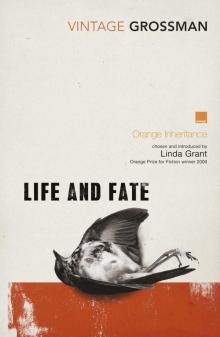 Life and Fate
Life and Fate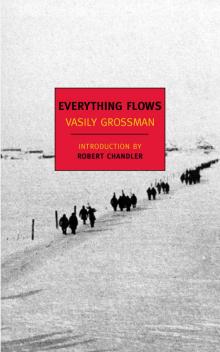 Everything Flows
Everything Flows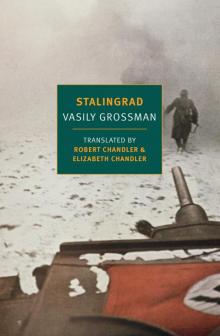 Stalingrad
Stalingrad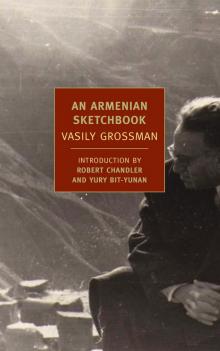 An Armenian Sketchbook
An Armenian Sketchbook The Road
The Road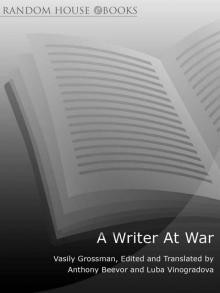 A Writer at War
A Writer at War